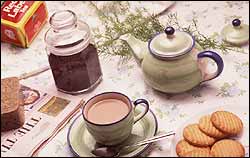 Usha Mani
travels beyond the invigorating taste of tea to discover a cupful of healthy
benefits
Usha Mani
travels beyond the invigorating taste of tea to discover a cupful of healthy
benefits
Now we all know how rejuvenating a cuppa chai can be
- at all times, for all ages! But, did you also know, that hidden away inside
every sip are substances capable of boosting our bodies' defences to help fight
chronic diseases? Read on to know
more.
Your Cup Of Tea
Contains...
Antioxidants:
They are one of the key requirements for human nutrition. Tea contains high
levels of antioxidants called polyphenols or flavonoids, which reduce your risk
of developing cardiovascular disease, cancers, cataracts, macular degeneration,
cognitive impairment, osteoporosis, Alzheimer's and liver
diseases.
Flouride:
It is
required to support bone mineralisation and protect teeth against dental caries.
Tea provides 70 per cent of our daily fluoride intake.
Vitamins And
Minerals like carotene, a precursor to Vitamin A; Thiamin (Vitamin B1);
Riboflavin (Vitamin B2); nicotinic acid, pantothenic acid, ascorbic acid
(Vitamin C), Vitamin B6; folic acid; manganese and potassium. Plus, when added
to milk, which is how tea is enjoyed by most, it can provide a number of other
vitamins and minerals. Simply put, it's nutrition
packed!
Tea And Health
Research shows that both black and green teas are excellent means
of lowering the risk of heart diseases.
Due to the presence of
antioxidants, tea acts as an 'oxygen radical scavenger'. In fact, several diet
recommendations have included both green and black tea to help protect against
cardiovascular diseases.
Tea helps in better metabolic functioning
and thus keeps the intestines healthy.
Polyphenols, which are present in
tea, have a beneficial effect in changing intestinal bacterial growth.
What happens is the bacteria that are less useful in maintaining a healthy
intestinal physiology are partially suppressed by tea, and beneficial bacteria
are favoured. Also, tea (without milk), can be used to treat diarrhoea in
children.
Studies have proved that
tea resists the growth and development of various
cancers.
Epidemiological studies have indicated that the high
concentration of phytochemicals may help in stabilising free radicals, thereby
decreasing the risk of cancer. It is also reported that tea could play an
important role in changing the genes involved in the process of causing cancer,
a claim, which has also been supported by chemical studies. It also increases
apoptosis, a process whereby tumour cells are eliminated.
Tea helps develop strong
teeth.
Since tea contains fluoride, it is considered teeth-friendly.
It protects against tooth decay and inhibits plaque formation. It also improves
the clinical manifestation of oral
lesions.
It's helpful in the
treatment of Osteoarthritis.
Tea has proved beneficial in treating
rheumatoid arthritis and osteoporosis especially in post-menopausal women.
Osteoporosis and liver disease may also be reduced by drinking green tea.
Tea also reduces injury induced by
radiation.
What Is Herbal
Tea?
Here is a type that is not really (read, technically) tea!
That's because it's not made of leaves from the tea plant. It's named thus,
simply because it is made in the same fashion as tea is. Herbal teas are,
however, made from a wide variety of plants and herbs such as hibiscus and mint.
A relatively modern creation, they've become popular, as medical science has
paid great attention to the health affirming nature of certain plants and
herbs.
Tea Trivia
Tea
was discovered in 2737 BC by the emperor Sheng Nung, when tea leaves
accidentally fell into a pot of boiling water.
Tea is the most
commonly consumed liquid in the world (after water, of course!) with an
estimated one billion cups consumed daily worldwide!
Dr John
Weisburger, Director Emeritus of the American Health Foundation, has certified
that a regular intake of upto 10 cups of tea a day will contribute to your
health and wellbeing.
The most popular beverage in the world is tea,
except in England and Ireland, where beer is more popular.
Bleeding
is checked if a tea bag is applied on the wound. The tannin in tea activates the
thrombocytes for rapid
clotting.
Some Tea Myths
Busted
Myth:
Tea Contains
More Caffeine Than Coffee
Tea contains far less caffeine. In a 190-ml cup
of tea, the caffeine content is 50 mg, whereas in the same quantity of instant
coffee, the caffeine content is 75 mg. It increases to 100-115 mg for filter or
percolated coffee.
Myth:
Tea
Is Diuretic
No. Tea does not have a diuretic effect unless the amount of
tea consumed at one sitting contains more than 250-300 mg caffeine, which is
equivalent to five to six cups of tea. In fact, the British Dietetic Association
advises that tea can contribute towards the daily recommended fluid intake of
1.5 to two litres.
Myth:
Green Tea Contains No Caffeine
Both black and green teas are produced from
the same plant, Camellia Sinensis and thus contain a natural amounts of
caffeine.
Myth:
Tea Stains
The Teeth
Recent studies suggest that the flavnoids and fluoride in tea may
actually be beneficial to teeth in reducing cavities and helping to prevent
plaque from developing. As long as teeth are brushed regularly, stains, if any,
can be removed.



